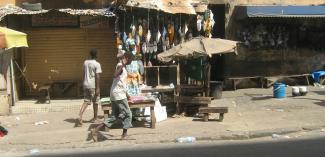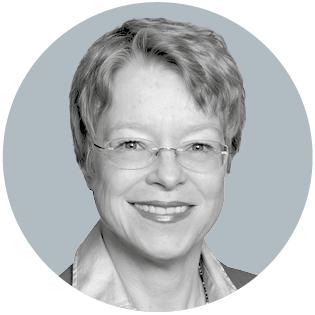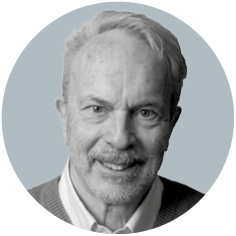Social norms
Marginalised majority

How did the YBF come into being?
When I returned to Ghana from my studies in Germany and the Netherlands, I worked in a management position in human resources. Thus I interviewed young people, and got very frustrated by their attitude. They showed no initiative, no engagement, no dedication to work. And they did not show any interest in policy issues either. There was a total mismatch between their education and the job market needs. I asked myself: What can I do? The task is to bridge this gap between youth and society. The YBF was officially registered in 2005. Community activities started around 2004 in Spintex, a new and growing middle class neighbourhood in Accra. It is a modern estate where people move to from outside. Spintex has no traditional village life. People come home after work to their apartments. On holidays, the family entertainment is mainly eating and watching TV. We organised what we called a Creative Writing and Arts Family Festival, bringing families come together.
How does that relate to the apathy of young people you just mentioned?
Well, the point is to get the young generation to express itself. The core problem is that the marginalisation of youth is deeply rooted in African culture. It starts at home. Children learn in their families that they are not supposed to speak when adults are speaking. The young generation’s opinions do not count. You are not allowed to make a contribution, so you have no responsibility. And you become afraid of challenging authority – it is a taboo. There is a proverb saying: “When the father bathes, water is finished.” It means that the adult has the final word. When the chief has spoken, the debate is over. This continues at school. You must never suggest the teacher has made a mistake, even when it is obvious. Asking questions is considered impolite. Questioning adults is disrespectful. There is no right for children in the classroom. And it goes on in the working environment. You cannot question your boss. By the way, this culture of obeying seniors and superiors no matter what makes it very hard, or even impossible for people who studied outside Africa to get along back home. They have connected to another world, and want to make a difference, relying on their own ideas. So they become frustrated and many of them leave Africa again.
So this sense of seniority is very strong.
Yes it is, and it continues in governance. Even in parliament, if you are a young member and raise an argument, you will hear: “What do you know! When were you born?” Another proverb says that while not everyone has the opportunity to achieve adulthood, everyone has once been a child. In this cultural setting, questions of accountability become obsolete. It takes extra boldness to question what the president does with state resources. At the same time, the age groups 18 to 35 made up 58 % of Ghana’s voting population in 2012. If the country is to develop well, they must not be ignored.
Given the apathy you described, how can you engage young people?
The first step is to recognise the situation. It does not help to blame the youth. We must help them understand that their situation is not good, and that there are better options. Let them see the benefits they stand to gain. Assure them you are going to walk with them and hold their hand when necessary and invite them to make a difference.
But are they interested at all?
You have to create opportunities, for instance skills development. Given the chance to learn something of practical use, they will take it. For example, we engaged a mining company to sponsor professional training courses in villages where it is active. This attracts young people who do not want to sit at home idle. We work at the grassroots, so we have to speak their language. We vary our approach according to the group. We interact and do our best to make people feel comfortable. You must never be arrogant. We also cooperate with existing youth groups and spread practical information. We are telling them, for instance, that the president will set up a youth development fund and how to access it. Many are eager to get active. The youth in Africa has seen what is happening around the globe: Arab spring, Occupy Wall Street. They want a way to register their protest too. We show them a peaceful way for doing so. We create platforms for debate.
What kind of platforms?
Well, we invite leaders of the district administrations, traditional chiefs, and even ministers to discussions with the youth. That really inspires them. Wow – I shook hands with the president! Let them experience that this is possible!
But do the political leaders play along?
Engaging politicians is the most beautiful part. They make such wonderful statements at the African Union or when they address their own nation. So we grasp opportunities to remind them: “You said, your government has an open door policy for the youth.” Or: “You underlined the importance of youth issues for your government.” We make them face the young public and live up to their rhetoric.
What must be avoided?
African governments, if you are aggressive, they do not care. Being called an autocrat is not seen as an insult. You have to create platforms where politicians can engage with the youth and you have to build the capacity of the young people to talk when they get the opportunity. There is this story of the goat that is tied around a tree for one year. When you remove the rope, the goat will still only eat and sleep there. Metaphorically speaking, African youth is like that goat. Young people need exposure, and that is what we try to offer. The YBF constitution states that our mission is to mobilise resources, including information, and to create platforms. We equip the youth with appropriate facts and figures, and we teach them research and evidence-based advocacy.
Youth Bridge Foundation recently organised a Round Table on the creation of a National Youth Parliament – NYP for short – in Ghana. What is this about?
The African Youth Charter is a continental protocol and was ratified by 32 African countries, including Ghana. The Charter’s § 11 states that the countries shall develop models for youth participation in decision making and recommends the creation of National Youth Parliaments. The challenge is that young people lack the capacity to make demands accordingly. Many do not even know that the Charter exists, so most countries do not have a NYP. Ghana has tried to establish one, but there are difficulties.
What kind of difficulties?
Well, on 17 August 2012, Honorable Clement Kofi Humado, then the minister for youth and sport, conceded that the Government of Ghana was looking to institutionalise a NYP, but did not have the necessary funds. However, this is not just a funding issue, it is also about structures and procedures. The National Youth Authority (NYA) started the NYP process but could not sustain it. So we had to pick up the challenge as civil society to broaden stakeholder consultations. We don’t condemn anybody, we are just asking: “Please try a little harder.” We did some research, wrote a background paper and organised a roundtable. We are asking for broader representation. We are not there yet, but our contribution is driving the discussion forward. We cannot simply blame African governments for not establishing NYPs, civil society must play its part too, helping to draft clear-cut roadmaps towards sustainable NYPs. The current Minister of Youth, Honorable Elvis Afriyie Ankrah, has also shown commitment to the process.
The YBF has become active beyond Ghana. Why are you keen on international networking?
Because there are many lessons to be learnt. Within Africa you find similar problems. Each country is different of course, just as the fingers on one hand are not all of the same length. That said, we all have the same trend of huge youth-population growth and youth marginalisation at the same time. The young generation holds the key to the pan-African dream of our forefathers. We can build capacities by learning from each other, by sharing experiences. But I’m also interested in networking beyond Africa.
Why?
We need to be in touch with European partners, for instance, because our continents share a long history. We are thankful for the support we get from German agencies for such purposes. And we must not forget that China is interested in Africa too. My vision is an International Youth Development Center in Accra.
Seth Oteng is the founder and director of the Youth Bridge Foundation (YBF) and would like to thank GIZ for its support.
soteng@youthbridgefoundation.net
http://www.youthbridgefoundation.net














